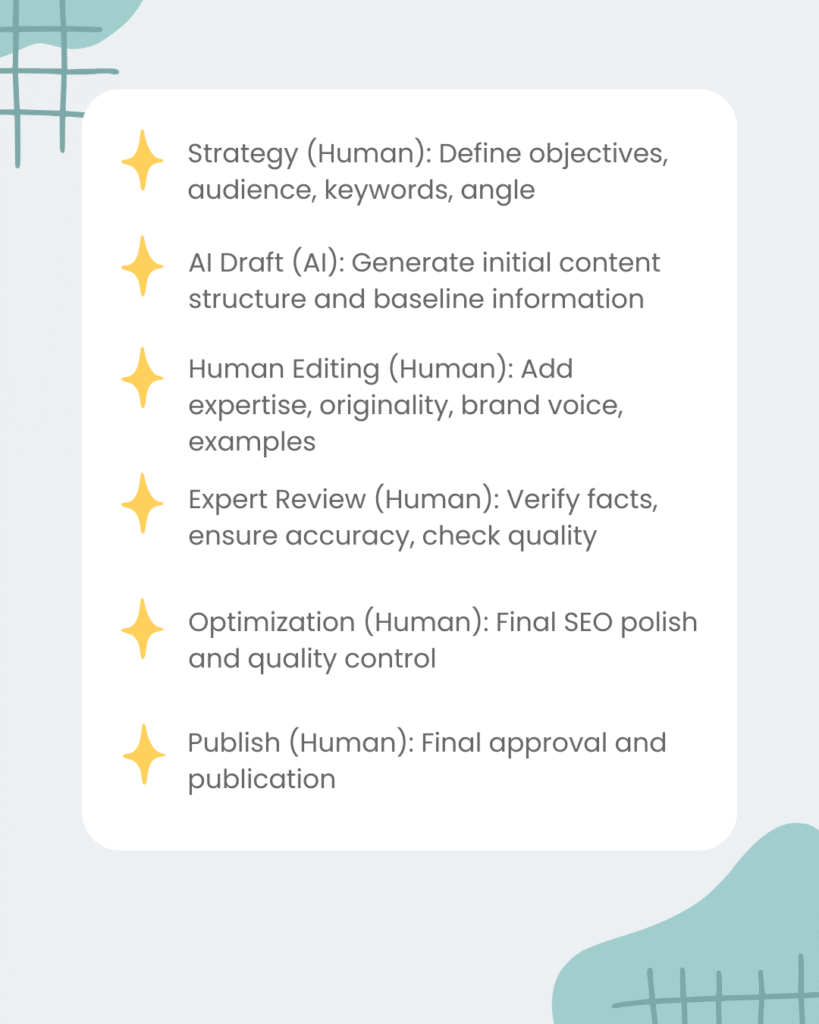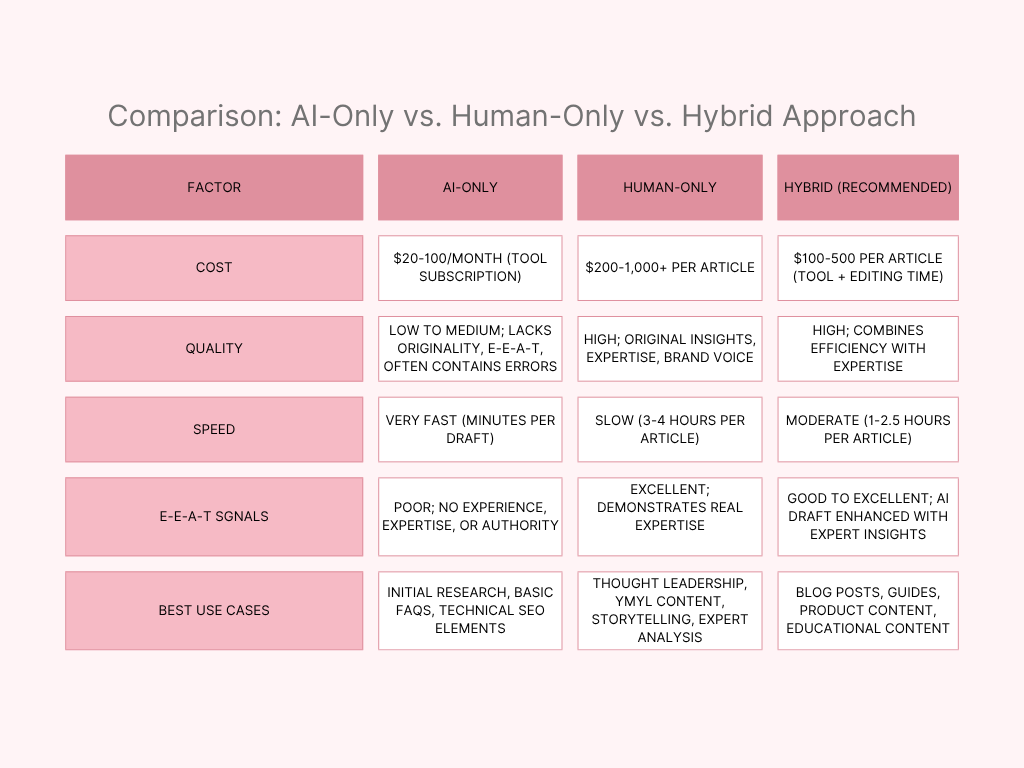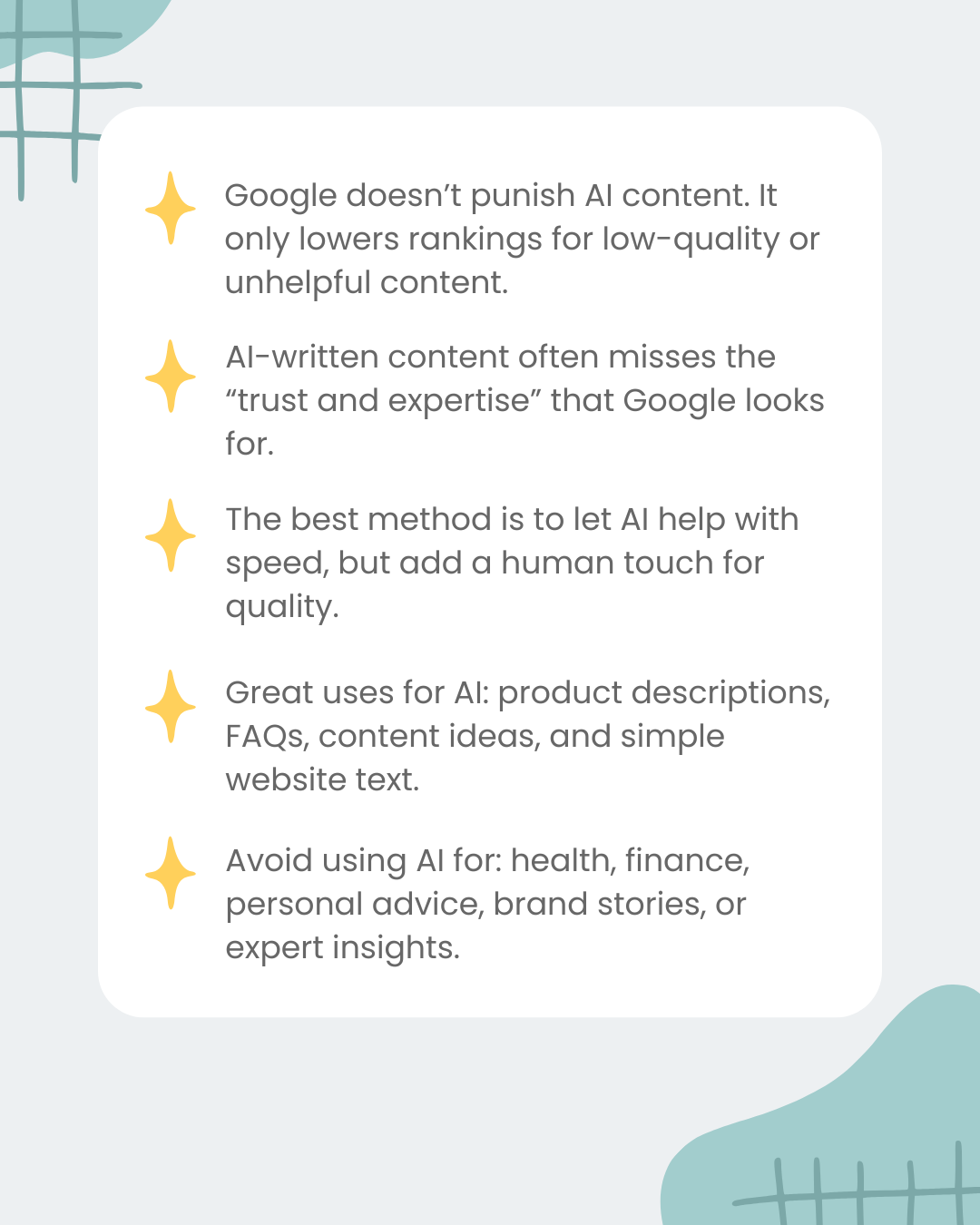The explosion of AI writing tools has transformed content creation, but it’s also raised a critical question for marketers and business owners: Does AI content actually work for SEO?
The short answer: Yes, AI content can work for SEO, but only when used strategically and responsibly.
This isn’t about choosing between AI or human writers. It’s about understanding where AI adds value, where it falls short, and how to combine both for maximum results.
AI content will not get you in trouble if it is helpful and shares a unique point of view. But if you use AI to make hundreds of random pages, it will not help your SEO or rankings and can even hurt them. The best way is to use AI smartly to create useful content while keeping the quality high.
In this guide, we’ll break down everything you need to know about using AI for writing content that ranks well on Google. You’ll learn what works, what doesn’t, what Google really thinks about AI content, and how to use it the right way.
Table of Content
- What Is AI-Generated Content
- Can AI Content Rank on Google
- The Pros of Using AI Content for SEO
- The Cons of Using AI Content for SEO
- When AI Content Works Well for SEO
- Content That Shouldn’t Be Generated by AI
- Best Practices: The Hybrid Approach
- Example: AI Draft vs. Human-Enhanced Version
- Comparison: AI-Only vs. Human-Only vs. Hybrid Approach
- Conclusion: The Balanced Approach to AI Content
- Partner with Designomate for Strategic Content Excellence
What Is AI-Generated Content?
AI-generated content is text created partially or entirely by artificial intelligence tools like ChatGPT, Claude, Jasper, or Google’s Gemini.
What AI Can Create:
- Blog posts and articles
- Product descriptions
- Meta descriptions and title tags
- FAQ sections
- Content outlines and structures
- Social media captions
Key Limitations:
- Cannot verify factual accuracy
- Lacks real-world experience and expertise
- Doesn’t understand brand voice without extensive prompting
- Can’t produce truly original insights or perspectives
- May generate outdated information based on training data cutoffs
Understanding these capabilities and constraints is essential for using AI effectively in your SEO strategy.
Can AI Content Rank on Google?
Google’s Official Stance
Google’s official position is clear: They don’t penalize content simply because AI created it.
According to Google’s Search Quality Guidelines, the search engine evaluates content based on quality, not creation method. Google Search Liaison Danny Sullivan has emphasized that Google’s systems “reward high-quality content, however it is produced.”
However, this comes with a critical caveat: Google’s algorithm updates, particularly the Helpful Content Updates throughout 2024 and into 2025, specifically target low-quality content designed to manipulate rankings. Many sites relying heavily on unedited AI content have experienced significant traffic declines.
The E-E-A-T Framework
Google uses E-E-A-T (Experience, Expertise, Authoritativeness, Trustworthiness) to evaluate content quality. This framework represents the biggest challenge for AI content:
- Experience: Has the content creator actually done what they’re writing about? AI has no real-world experience.
- Expertise: Does the author have subject matter knowledge? AI aggregates existing information but doesn’t possess genuine expertise.
- Authoritativeness: Is the source recognized as a go-to authority? AI-generated content lacks the credentials and recognition that build authority.
- Trustworthiness: Can readers trust the accuracy and reliability of the information? AI hallucinations and factual errors undermine trust.
Where AI content consistently fails is in demonstrating these qualities. Pure AI output lacks the personal insights, real experiences, and demonstrated expertise that signals quality to both Google and readers.
Google’s Spam Policies
While Google doesn’t ban AI content, it does penalize certain uses:
Scaled Content Abuse: Using AI to mass-produce numerous low-value pages designed to manipulate rankings violates Google’s spam policies. The key distinction is intent, content created to serve users is acceptable; content created solely to game rankings is not.
⚠️WARNING: Several high-profile websites have experienced dramatic traffic drops after algorithm updates. Industry reports document cases where sites lost 90-99% of their organic traffic following heavy reliance on unedited AI content. The pattern is consistent: mass-produced AI content without human enhancement triggers algorithmic penalties.
The Pros of Using AI Content for SEO
When used appropriately, AI offers genuine benefits for content creation:
1. Massive Time and Efficiency Gains
Traditional content creation typically takes 3-4 hours per 1,000-word blog post. With AI assistance, many teams generate a draft in 10-15 minutes, then spend 60-90 minutes editing and enhancing, potentially reducing total time by 40-60%.
2. Cost-Effectiveness at Scale
Freelance content writers commonly charge ₹0.10–₹42 per word, meaning a 2,000-word article costs ₹16,000–₹83,000. AI tools typically range from ₹1,600–₹8,300 monthly for unlimited content generation. For businesses needing high-volume content, product descriptions, location pages, basic informational content, the cost difference is substantial.
3. Consistent SEO Optimization
AI tools are trained on high-ranking content, making them naturally effective at technical SEO basics: proper keyword placement without stuffing, clean header hierarchy, meta description generation, and appropriate content structure.
4. Excellent for Brainstorming and Research
AI excels at overcoming the blank page problem. When you’re stuck for topics or need fresh angles, AI provides topic clusters, keyword variations, question identification for FAQ sections, and content gap analysis.
💡PRO TIP: Instead of asking “Give me blog topics about solar panels,” try: “I run a residential solar installation company in Florida. Generate 15 blog topics that address homeowner concerns about cost, installation time, and hurricane durability. Focus on questions customers ask during consultations.”
5. Content Repurposing
AI efficiently transforms content across formats: blog posts into social media snippets, long-form articles into email newsletters, technical content into beginner-friendly versions, and content adaptation for multiple languages (with human review).
The Cons of Using AI Content for SEO
The risks of AI content are real and significant:
1. Generic, Repetitive Output
AI content is often “vanilla” and lacks unique perspectives or a distinctive voice. When competitors use the same tools, the resulting content blends in. Since Google rewards originality and new value, unoriginal AI content won’t rank well.
2. Factual Inaccuracies and Hallucinations
AI often “hallucinates” by creating false data, citations, or product features. These inaccuracies damage your authority in SEO and can lead to legal problems so it is important to look out for these inaccuracies.
3. Lack of Human Touch and Brand Voice
I misses key human elements like personal experiences, empathy, brand personality, and engaging storytelling. Readers quickly leave robotic, personality-free writing. This poor engagement hurts your SEO.
4. Poor E-E-A-T Signals
AI cannot demonstrate real expertise or industry authority. It also lacks the trustworthiness that comes from proven accuracy. This is a major problem for YMYL (Your Money Your Life) content like articles on health, finance, and law.
Check below for what type of content shouldn’t be generated by AI
5. Doesn’t Perform Well Long-TermThe most compelling evidence against pure AI content strategies comes from real-world performance data. Industry case studies document instances where sites publishing large volumes of unedited AI content experienced initial traffic gains followed by dramatic drops, in some documented cases, traffic declined by 90-99% after Google’s algorithm updates.
When AI Content Works Well for SEO
AI isn’t appropriate for all content, but specific use cases deliver genuine value:
High-Volume, Low-Stakes Content
- Product Descriptions: E-commerce sites with hundreds or thousands of products benefit from AI-generated baseline descriptions that editors can refine for brand voice.
Check out a Shopify app FossEngine to generate product description in bulk
- Location Pages: Local SEO often requires similar pages for multiple locations. AI can create the structure, with humans adding location-specific details and local insights.
- FAQ Sections: AI efficiently generates comprehensive FAQ content based on common questions, which editors then refine for accuracy and clarity.
Content Foundation and First Drafts
The most effective AI application is using it for initial structure: generate outlines and section frameworks, create baseline drafts that establish information flow, and overcome blank page syndrome. Many agencies allocate 15-20% of content creation time to AI drafting, then invest 80-85% in human refinement, enhancement, and expertise infusion.
SEO Technical Elements
AI handles technical SEO tasks efficiently: meta titles and descriptions optimized for character limits, header tag recommendations, alt text for images, internal linking suggestions, and schema markup generation.
Keyword Research and Topic Ideation
AI excels at generating keyword variations and long-tail opportunities; however, make sure you double-check the results with Google’s Keyword Planner, SemRush, Ahrefs, or another keyword volume checking tool. AI is also very effective at identifying related search terms and questions, creating content cluster structures, and analyzing competitor content for gaps.
Content That Shouldn’t Be Generated by AI
The content that shouldn’t be generated by AI includes topics where trust, expertise, and real-world accuracy are critical. Specifically:
- YMYL (Your Money Your Life) Topics:
- Health/Medical advice
- Financial advice
- Legal advice
- Any content requiring a demonstration of:
- Real-world experience with the subject matter.
- Professional credentials or expertise.
- Industry authority and recognition.
Trustworthiness based on demonstrated accuracy over time.
Best Practices: The Hybrid Approach
Success with AI content requires systematic processes and disciplined execution.
AI-Assisted, Human-Perfected Workflow
The winning formula: AI provides the foundation, humans provide the value.
Recommended Workflow:

Expected Time Investment: Plan for 40-50% of traditional writing time for proper editing. A task that traditionally takes 4 hours might require 1 hour for AI drafting plus 1.5-2 hours for human enhancement.
Prompt Engineering for Better Results
Generic prompts produce generic content. Effective prompts include specific context about audience and purpose, tone and style guidance, constraints (word count, structure requirements), and examples of desired output.
Example of Poor Prompt: “Write a blog post about email marketing.”Example of Effective Prompt: “Write a 1,500-word blog post introduction about email marketing automation for small business owners with limited technical skills. Use a friendly, educational tone. Focus on explaining benefits before diving into tactics. Include a specific example of how automation saved a small business time. Avoid jargon.”
Mandatory Editing Checklist
Every piece of AI content requires:
- Fact-Checking: Verify every statistic, claim, date, and source citation
- Originality Addition: Insert unique insights, proprietary data, personal experiences
- Brand Voice Integration: Rewrite sections to match your distinctive tone
- E-E-A-T Enhancement: Add author credentials, expertise signals, authoritative citations
- Storytelling: Replace generic examples with specific, memorable anecdotes
- Repetition Removal: AI often repeats ideas, cut redundant content ruthlessly
Transform AI content by adding:
- Experience Signals: “In our work with [type of clients], we’ve found…” or “After testing this approach across dozens of campaigns…”
- Expertise Indicators: Author bylines with credentials, references to certifications, technical depth that demonstrates mastery
- Authority Markers: Citations of original research, quotes from recognized experts, links to authoritative references
- Trustworthiness Elements: Detailed author bios, transparent sourcing, admission of limitations, regular content updates with revision dates
Example: AI Draft vs. Human-Enhanced Version
Scenario: Blog Introduction for “How to Choose a CRM”
AI Draft (Unedited): “Choosing a CRM system is an important decision for businesses. A CRM helps manage customer relationships and improve sales. There are many CRM options available in the market. This guide will help you choose the right CRM for your business needs.”
Human-Enhanced Version: “You’ve tried managing customer data in spreadsheets. You’ve lost deals because follow-ups slipped through the cracks. You know you need a CRM, but you’re staring at dozens of options, and they all claim to be ‘the best.’
After implementing CRMs for over 100 clients, we’ve seen the same pattern: businesses don’t fail because they choose the wrong CRM. They fail because they choose based on features instead of their actual workflow. This guide walks you through the decision framework we use with clients.”
What Changed: Added empathy and real pain points, included expertise signal (100+ implementations), provided unique insight (choose based on workflow, not features), used conversational tone, created narrative flow.
Comparison: AI-Only vs. Human-Only vs. Hybrid Approach

Conclusion: The Balanced Approach to AI Content
AI content works for SEO when you use it as a tool to enhance human expertise, not replace it. The agencies and businesses seeing success with AI aren’t using it to cut corners, they’re leveraging its efficiency while maintaining rigorous quality standards.
Partner with Designomate for Strategic Content Excellence
At Designomate, we understand that AI is a tool, not a shortcut. Our approach combines AI efficiency with human expertise to deliver content that ranks, engages, and converts.
Every piece of content we produce receives strategic planning aligned with your business objectives, expert editing and enhancement by experienced content strategists, rigorous fact-checking and quality assurance, and E-E-A-T optimization for maximum authority and trust.
Schedule a Free Content Strategy Consultation
Explore Our SEO Content Services
The future of SEO content is not about choosing between AI and humans, it is about knowing how to combine both for maximum impact. Let’s build that strategy together.






